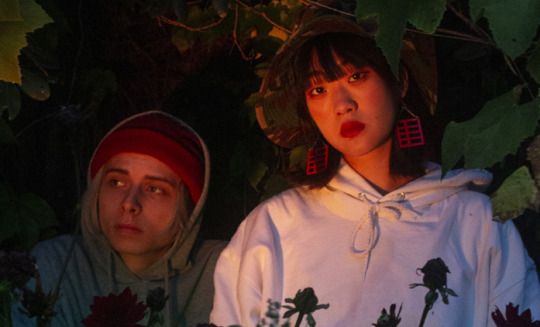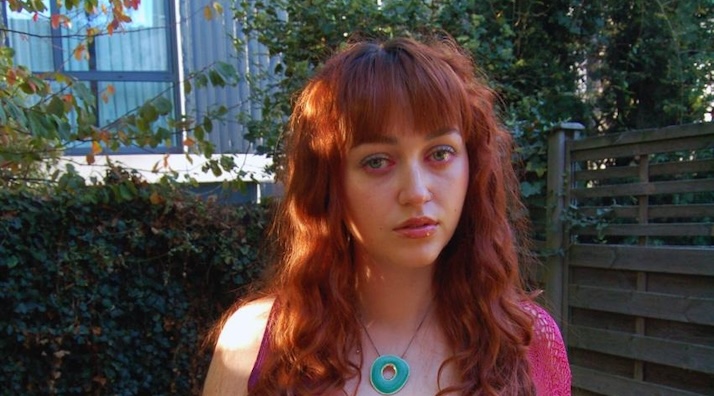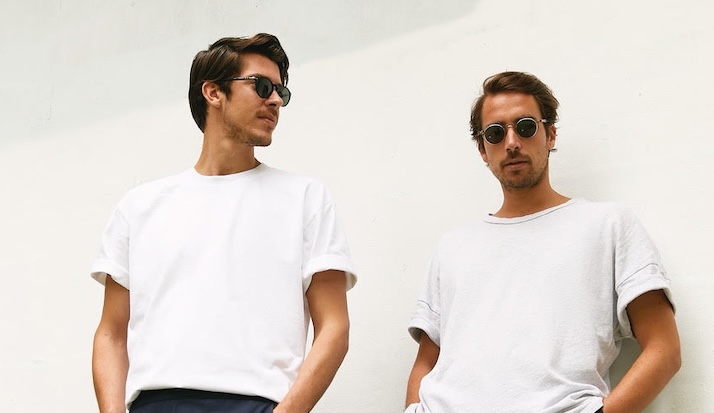Imugi Have a Knack for Honest Lyrics With Warm Vibes [Q&A]

Electronic duo Imugi makes the kind of music that's hard to condense into a neat little introductory sentence. When asked to describe it, Yeri Cho and Carl Ruwhiu often just use the umbrella term 'electronic music,' since technically it's exactly that. But it's also part pop, part RnB, part rap; a little spoken word and a lot of dreamy synths, all melted into a sound that's both cohesive and distinctive. "I hate to be that bitch," Yeri laughs, "because you feel so pretentious being like, ‘No, we don’t define ourselves with a genre.' But it kind of is like that," she explains. "It’s fun because it’s experimental."
Imugi's sonic eclecticism is largely thanks to their broad-reaching reference pool, something they've honed since day dot. Carl cut his beat-making teeth recreating Soulja Boy tracks on Fruity Loops, after discovering the artist mostly used the software's stock samples. "Soulja Boy is a true pioneer," he says. "He was like the originator of viral content on the internet. Soulja Boy’s an absolute legend." Facts. Meanwhile, a young Yeri was neck deep in emo music, her second major music obsession after K-pop. "I think that has never left me," she says of the scene that gave a generation of teens an outlet to channel their inner angst and side fringes. "It was such an open raw expression of all these really emo lyrics," she says, adding, "It’s hard to express yourself as a kid, growing up."
Yeri and Carl met in stats class when they were in seventeen, in a rare case of high school math actually being useful for something. They found themselves a heavily music-orientated friend group, playing in bands and spending lunchtimes in classrooms trading tracks instead of snacks. After a mate recommended they make some music together, the pair knocked heads and came up with debut track Dizzy. Then they shared it to Soundcloud and Bandcamp, "just to see what would happen," Carl says.
What happened was an unexpected surge of attention, and they realized they were probably on to something. Fast forward a couple of years and they released debut EP Vacasian in 2017, a body of work they point to as a milestone. "It was such a team effort, and the first time we really sat down and planned out a cohesive little project," Carl says. Another thing they're stoked about? Just sticking with it. "There’s so many demons and external things going on that you really can’t do much about," Yeri says of the industry. "So, it’s learning how to validate ourselves, and continuing when it feels a little bit scary and hard to put ourselves out there."
Now they've just released their second EP Dragonfruit, an impressive collection of trippy beats and lyrics that read like poetry. They like to think of it as a pack of tarot cards, a different song for every mood. Made during the duo's formative early-twenty years, the tracks trace everything from being jaded af in the hazy "Greensmoke, to resignation in relationships on the Church and AP-featuring "y u always acting like a fool," to grappling with the imposter syndrome that makes you want to turn into "a man with a job and a wealthy mouth" (Somebody Else). If that all sounds bleak, it isn't. Imugi have a knack of fusing honest lyrics with warm vibes, ripe for soundtracking a lazy summer day sipping spritzes beachside. "A lot of the songs came from this place of excitement," Carl explains, "and wanting to create something big and epic to share with people."
We caught up with the pair ahead of their killer set at the very first Ones to Watch showcase to chat collaboration, the good kind of DMs, and the virtue of taking some time out once in a while.
Ones to Watch: After you released Dizzy, you took a bit of a break, right? You went and studied English Lit, right Yeri?
Y: How do you know this?!
Google! It’s amazing.
C: There’s information about us on the internet!
And Carl, you studied…
C: Audio engineering.
What made you want to go and do that?
Y: Uh, my mum. [laughs]. The immigrant dream.
C: I feel like when you get to that age, the normal thing is to go to uni. It felt that that’s kind of what’s expected of you, that you have to do more education after school. So, I felt that I had to study something. And I just thought, even if I don’t end up being an audio engineer for the rest of my life, it’s still valuable information that I want to learn. It was cool, and it was a big break for Yeri and I 'cause…
Y: Just like, life stuff.
C: Yeah, we went to separate schools and I moved houses, and we did spend a little while apart not working on music. But it was also a time for us to practice our writing and production and stuff. Cause I feel like, we put out Dizzy, and then all of a sudden, we got all this great feedback from it. Then you feel this immense pressure to put out something that’s going to meet that same threshold. So, I feel like it was a lot of, 'what do we do next.’
Y: And we hadn’t really honed in on what kind of sounds we want to make at that point.
C: Exactly, 'cause it was the first song we’d written together.
Y: And we were 18 years old, just on our bullshit.
C: Yeah, so I think that break was necessary for us to just kind of like…
Y: Live.
When you’re making music together, how does it work? Are you making beats Carl, and then are you writing lyrics and vocal lines Yeri?
Y: It’s a bit of both. I feel like there’s a lot of overlap in what we do. Most of the time Carl will make a beat, and we’ll be having a music session and craft it together. Or I’ll have words that I’ve written in the past and bring back up. But lately, the new stuff we’ve been writing, we’ve kind of just been doing it on the spot and crafting it together.
C: It's a mixed bag, depending on what song it is. A lot of the time it will start as a simple little loop, or I dunno, just Yeri and I sitting down and talking about the music we wanna make, and what we want to do. We’ll just catch up, have a big brainstorm about the music that we like, what we kind of envision working as a project in the future. And from there we’ll go out and spend some time apart, and I’ll make a few beats and mess around on the computer, and Yeri will be writing some poetry or ideas in her notebook, and when we catch up, we’ll choose the best beats or the ones that we like the most. Then we’ll flesh them out, and Yeri would’ve already had some ideas.
Y: It’s like putting puzzles together.
Like Tetris.
Y: Exactly.
C: It is a much more collaborative process than people realize. I think people see us on stage and are like, 'oh that guy makes the beats, and she sings the lyrics’, but there is a lot of collaboration when we write the songs.
How would you describe your music to someone who’s never heard it before?
Y: And it’s hard because we pull from so many different elements of different genres to make songs. But I feel like it’s very varied from song to song. Some songs will be very indie, poppy, almost RnB vibes. Then some songs will feel like, what do they call it? “Bubblegum rap.” Then we’ve got this new stuff that’s sounding really emo.
C: It’s difficult to pinpoint our sound because I dunno, at the core of it we’re such music fans. And we’re always following all the artists that we love, listening to their music, so for that reason our tastes are always evolving. And there’s always different influences that we do get. So, it’s hard to describe our sound in a nutshell.
Y: It is what it is.
What do you feel are some of your biggest successes to date?
C: I think our biggest success is that people like our music. We’re just stoked that the stuff that we’re passionate about, and that we really want to make, and that we want to hear people make, that it’s something that clicks with people, and people appreciate it. So, I think that’s one of our greatest successes, that people enjoy our music and want to come to our show and will follow us on Instagram.
Y: And be present with us when we’re doing shows. Even just coming up to talk and being like 'hi I like your stuff,’ because it means the world. Because we don’t really think about the audience, or the reception of our music when we put it out. We’re just like ok cool let’s put it out. So, it’s nice to know that someone out there is listening and relates a lot. And everyone interprets things so differently. Like some of the messages we’ve got are like, 'I’ve recently immigrated to this country from here, and I feel really alone, and listening to this makes me more connected.’ Or 'I just broke up with my ex and feel really sad, but your song helped me cry it out.’ Things like that are just really nice to hear, and I dunno, it makes you remember how human everyone is.
C: And the power you have with the art that you’re creating.
Y: Yeah, because you can kind of get lost in the 'industry’ and the 'reception’ and the 'business’, and you can feel kind of jaded. So, it’s nice to come back to the music, and be like, yes.



![Adam Klobi Chases Nostalgia in Latest Single, "FICTION" [Q&A]](https://s3-us-west-2.amazonaws.com/onestowatch-v2/adam__klobi_18-12-25-837-_edit-1769452305.jpg)